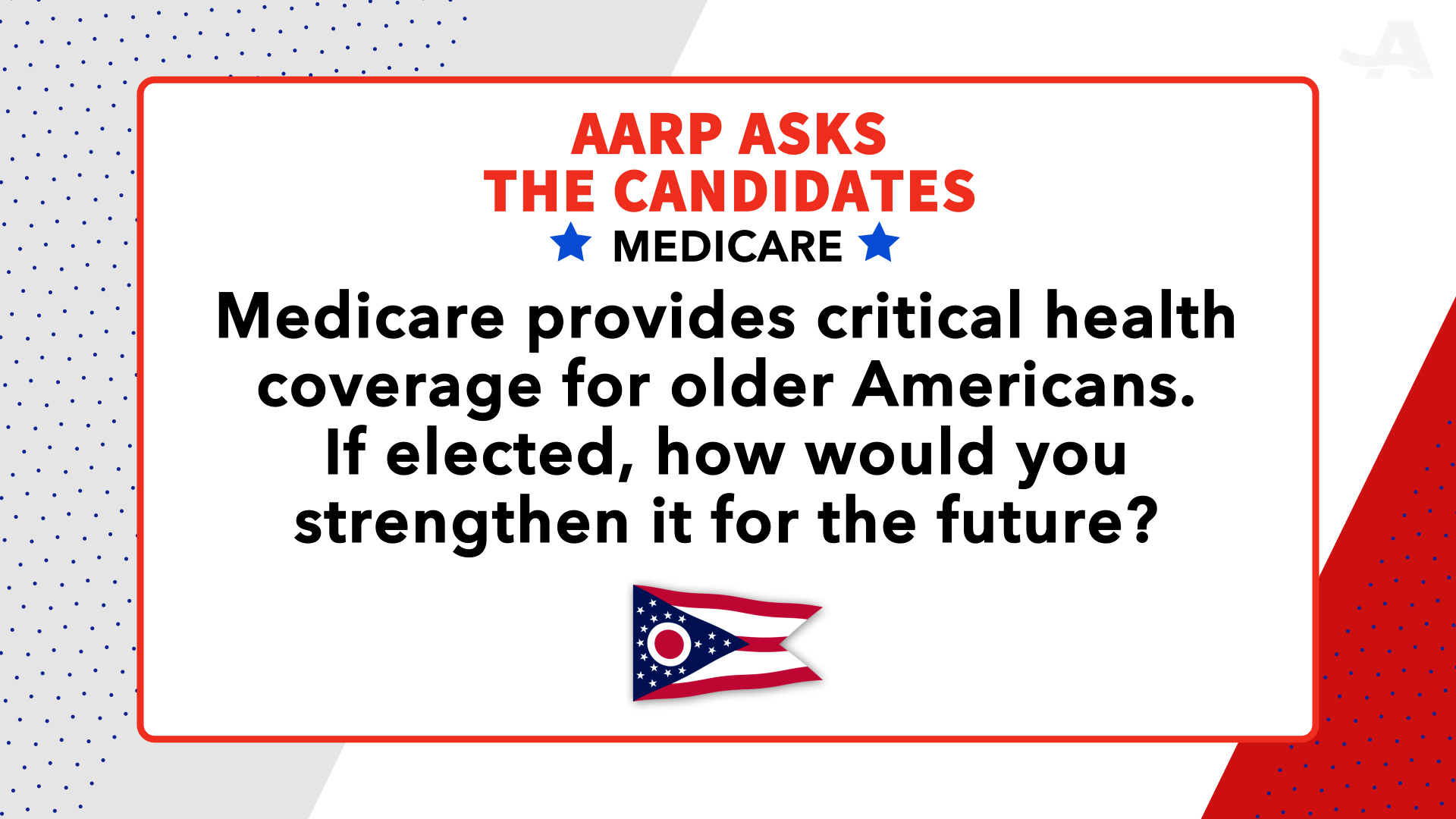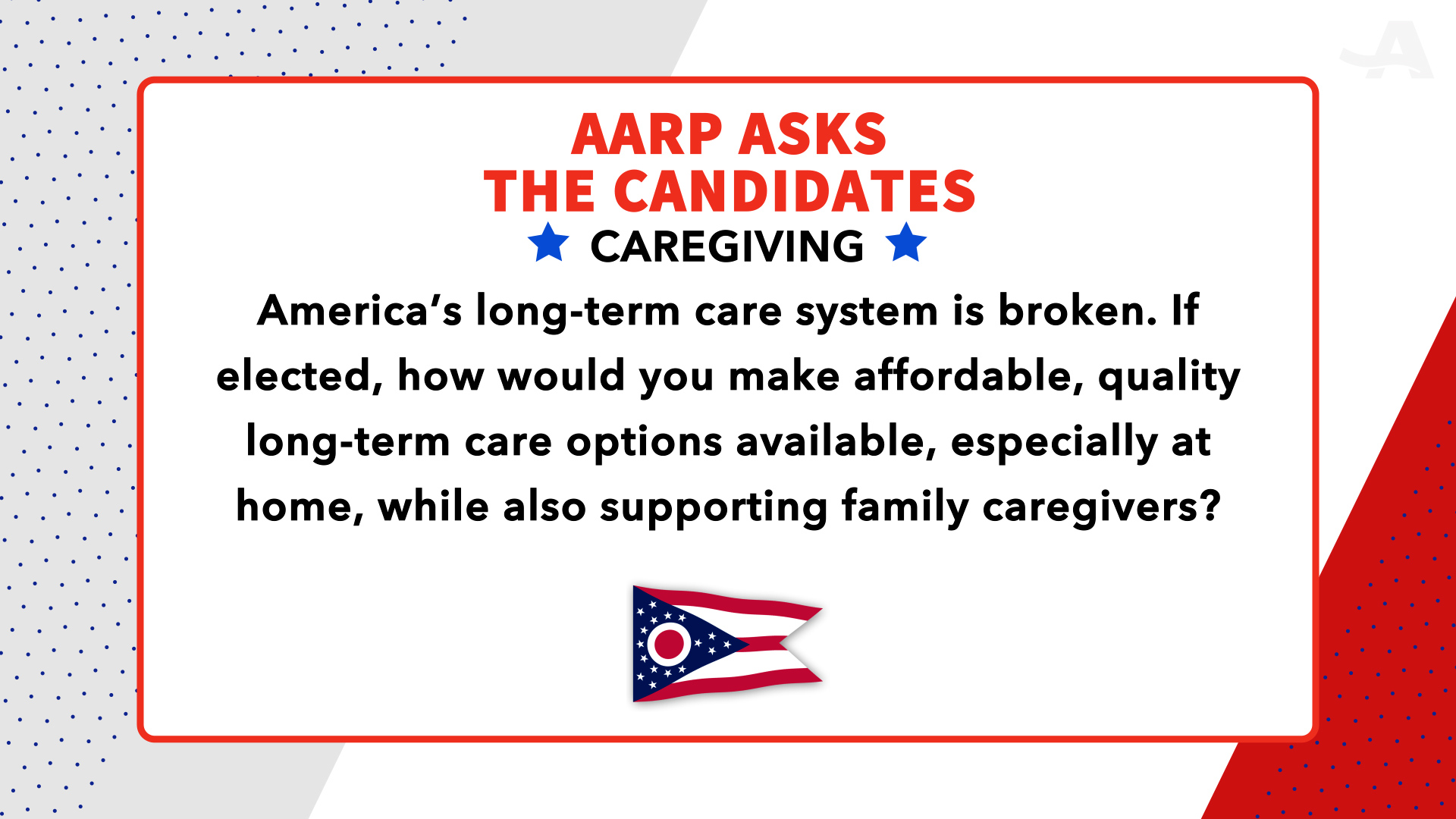AARP Hearing Center
AARP Asks Ohio Senate Candidates Tim Ryan, J.D. Vance Questions Vital to Voters 50+
Ohio voters will decide several closely watched races on Nov. 8, including the U.S. Senate contest between Democrat Tim Ryan and Republican J.D. Vance. AARP Ohio spoke with the candidates to learn where they stand on key issues for 50-plus voters. Here's what they had to say:

Vance: So I was raised by my grandparents, my Mamaw and Papaw, as I called them, and so I know how important it is to protect and preserve Social Security for our seniors and really everybody else. It's one of the great accomplishments, I think, in our country's history that we insured, as a people, that we weren't gonna let people just become destitute in old age, and I think that's such an important thing. That's such an important promise for our country to keep. To me, the biggest thing that we have to do to preserve social security for the current generation and the next generation is make sure the terrible inflation crisis doesn't destroy the value of those benefits. If the dollar's not going as far, the Social Security benefits have to be increased to catch up with the inflation. I think if we do that, we ensure that a lot of our seniors are able to live a good life in their retirement, which is exactly as it should be.
Ryan: For nearly a century, Social Security has been the earned benefit to make sure that seniors could retire with dignity. And I am a original cosponsor of Social Security 2100, which will allow us to not only support Social Security, not only to make sure that it's there for our seniors, but also to expand it, to provide a tax cut for seniors, 12 or 13 million seniors, who will get a tax cut to increase the cost of living adjustment for our seniors. This is a key program. I will continue to support Social Security 2100. I think we need to pass it, be a huge boom for seniors. As we see private pensions go down, as we see other forms of retirement go down, we need to expand Social Security to make sure that our seniors do have that dignified retirement that they were promised.

Ryan: Well, we've already taken many steps to reduce the cost of prescription drugs, giving Medicare the ability to negotiate down drug prices for over a hundred drugs, making sure that we cap out-of-pocket expenses at $2,000 through the Inflation Reduction Act and making sure we cap insulin at $35. We can continue to expand this approach of negotiating down even more drugs. And I think we also have to work with the Medicare program and the private sector and the U.S. government to bring back production of medicine from China. Ninety percent of our prescription drugs and the compounds are from China. We've gotta bring that back to the United States, and we can use the power and the leverage of the Medicare program to do that.
Vance: Yeah, so I remember when my Mamaw was buying her prescription drugs and recognizing that she was gonna have to sacrifice important medications in order for her to get the health care that she needed. And I think that's just ridiculous. A lot of people depend on Medicare. They should be able to depend on Medicare, and we shouldn't expect our seniors or anyone else to forgo the health care that they need because prescription drugs are too expensive. I actually think the biggest thing that we could do to bring down prescription drug costs is to allow us to reimport drugs into our country. If it's being sold in Europe at a way cheaper price, our government shouldn't be preventing us from bringing those prescription drugs into our country. It'll bring down health care costs for seniors, but also for everybody else. We have a great and innovative health care system in this country. We ought to fight to protect it. We also have to make sure that it's affordable and accessible, and I think prescription drugs are the most important ways in which, unless we bring those costs down, a lot of people are gonna be left on the outside looking in. So we gotta solve that problem.

Vance: So Medicare is obviously the way that a lot of our seniors get their health care, and we absolutely have to protect the program. I think there are a couple of big things that we can do. First of all, we have to make sure that politicians stop raiding Medicare money and spend it on other things. We should not be taking money away from our seniors, away from their health care, to fund other problems. A lot of those problems I think that we could fix if we just had better and smarter government. The second thing that we've got to do is recognize that a lot of seniors want choice and they want their Medicare dollars to go as far as possible. And so I think whether it's traditional Medicare, Medicare Part D, making sure these programs are properly funded, but also making sure that whenever seniors choose the things that they want to do, those choices actually serve their health care needs. If we do that, I think that we'll make sure the Medicare program continues to serve its function, which is really just making sure that our seniors get the health care that they need. And we got to fight for that protection far into the future.
Ryan: I have always fought cuts to Medicare and Social Security, and I think we need to expand the Medicare program. I think we need to allow people to buy into the Medicare program at the age of 60. I think that's critically important as we see the burden for seniors with their retirement, with health care and all the rest. Give them an opportunity to get in that program earlier. I'm also for expanding it. In the Inflation Reduction Act, we were able to expand coverage, free vaccines, we capped insulin spending at $35. We capped prescription drug costs for seniors at $2,000. My mom will fall into the donut hole, where she'll have to pay a thousand dollars a month. We cap that at $2,000, and we give the Medicare program the ability to negotiate down drug prices. These are critical, expanding coverage for Medicare. We also have to include dental, eyes and hearing. And I will continue to fight in the United States Senate for us to expand this program.

Ryan: So many caregivers are unpaid. They make all the sacrifices for their families, for their parents, for older family members and friends. And I believe that we need to make sure that they don't have to pay the economic price for doing the right thing for their family or their friends. That's why I'm a huge supporter of paid family and medical leave, that you should continue to get paid from your job, you should continue to get the benefits from your job if you're doing everything right for your family, if you're taking care of your parents or a kid, for that matter, that happens to be sick. Paid leave is very, very important. And I also think that there should be a caregiver credit, which means if you are working and you have to not work to take care of a family member, your credits aren't building up for Social Security. I believe if you continue to do that work, you should get the credits toward Social Security so you can have a dignified retirement too.
Vance: So, I think it's ridiculous that a lot of people can't get access to the long-term care that they need. I know some people use Medicaid to fill the gap. Some people use private insurance to fill the gap. But it's ridiculous that a lot of people have those gaps and they're not able to fill them. You know, a couple of ideas here. I think first of all, if you're having family caregivers provide long-term care, those family caregivers have gotta be properly reimbursed so they can continue to do it. And I think, frankly, a lot of grandparents are taking care of young grandchildren. They ought to be properly reimbursed. In the same way we treat foster care parents very generously, we ought to treat a lot of these grandparents who are taking care of grandkids generously as well. Before the long-term care, we've just gotta make sure this stuff is properly resourced. It's really a question about money, and we gotta make sure that we're taking care of people at all stages of life, and at the end of the day, if you're taking care of your parent, if you're taking care of your grandparent, you ought to be treated generously, because that's how we ensure a lot of these long-term care solutions are there for our seniors.
Also of Interest:
- Learn how and when to vote in Ohio at aarp.org/ohvotes
- Follow AARP's political coverage at aarp.org/elections
- Keep up with local events and AARP advocacy efforts at states.aarp.org/ohio

































































